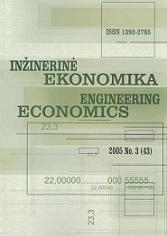Influence of Knowledge Culture on Effective Knowledge Transfer
Influence of Knowledge Culture on Effective Knowledge Transfer
Author(s): Asta Savanevičienė, Lina GirdauskienėSubject(s): Economy
Published by: Kauno Technologijos Universitetas
Keywords: knowledge organization; knowledge; knowledge culture; knowledge transfer.
Summary/Abstract: Contemporary organizations operate in turbulent environment, where a strong competition prevails. Present markets are no longer definite geographically, i.e., they became global and international. Therefore the organizations to further remain successful should acquire a longterm competitive advantage. However the enterprises become incapable to ensure this process, since their activities are based on limited material resources only. Unfortunately a competitive advantage may not be guaranteed even by human resources; the shortage of the latter both qualitative and quantitative becomes more significant every day. Knowledge, which generates a new creative potential and establishes a surplus value, becomes the main criterion of the success. Organizations, when developing new knowledge, create organizational perpetuum mobile, i.e., new invented products are manufactured, more efficient methods are applied, thus ensuring profitable activities, which enable to focus even more on the development, transfer and implementation of new knowledge in the organization. However desultory “hunting” or retention of the knowledge will not provide good results. A consistent and systematic process of knowledge management, which is defined by the stages of knowledge identification, acquirement, development, interchange/ distribution, application, and retention, is necessary. As one of the most significant factors the spread of knowledge may be mentioned, when knowledge created for all members of organization is transferred. Transfer of knowledge is particularly important, since individual knowledge does not form a surplus value, and may remain individual and ulterior. The main factors of knowledge management, which lead to successful knowledge management and ensure long-term competitive advantage, are organizational structure, culture, strategy, systems and IT infrastructure, effectual and systematic processes and their assessments (Liebowitz, 1999). Culture may be considered as an essential factor, which not only guarantees a successful knowledge management, but also influences an effective knowledge transfer. An appropriate formation of organizational structure, assurance of transfer channels, introduction of systems and technologies will not result in effective knowledge transfer (Akhavan, 2006). Since knowledge, whatever (definite or rather hidden) is transferred by people. And so often relatively called the “soft” part, i.e., culture, assumes a special importance and significance. Organizational structure allows, and organizational culture ensures an efficient knowledge transfer. The culture of knowledge is defined as organizational lifestyle, which enables and initiates people to create, share and use knowledge on behalf of organization and continuous success (Bock, 1999).
Journal: Engineering Economics
- Issue Year: 2007
- Issue No: 4 (54)
- Page Range: 36-43
- Page Count: 8
- Language: English

